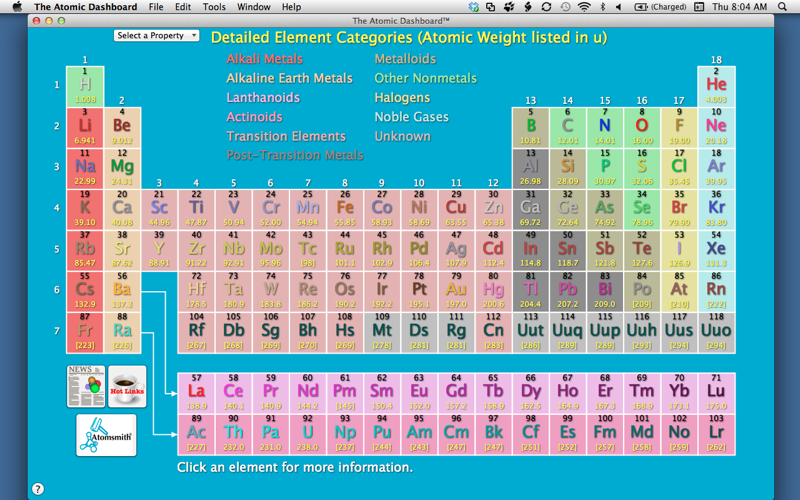
The Atomic Dashboard
The Atomic Dashboard
The Atomic Dashboard is an interactive chemistry resource and learning tool developed by Bitwixt Software Systems (@Atomsmith1). Used by educators, students, scientists, and the simply curious, The Atomic Dashboard features an interactive periodic table that lets you explore the chemical elements -- their properties, periodic trends, history, and relevance to society. And more exciting, with its new 3D Molecule Library and its physics-based, 3D models of atomic orbitals, molecules, compounds, gases, and crystals, you can explore the relationships between the behavior of atoms and molecules and their 3D structure.
A Dashboard for Chemical Knowledge
Nearly 150 years ago, the distinguished Russian chemist Dmitri Mendeleev discovered previously hidden relationships between the physical and chemical properties of the elements and their atomic weights. Ordering pieces of paper representing the elements into a two-dimensional grid -- a table -- he grouped together elements with similar properties. Thus was born the periodic table.
Over the years, as the periodic table was expanded, it revealed the organizing principles of matter. In fundamental ways, it contains all of chemistry -- in ways that even Mendeleev could never have dreamed. Master its secrets and youre on your way to mastering chemistry.
Yet, for much of that time the periodic table has remained lifeless -- a collection of boxes mounted on the walls of desolate lecture halls and on the inside covers of musty textbooks.
The Atomic Dashboard Brings the Periodic Table to Life
Whether youre a student, a teacher, or someone who just wants to understand how the universe works, The Atomic Dashboard will connect you to everything you need to know about the building blocks of matter, the elements:
• see what they look like in the macroscopic world
• dive down to see what they look like in the atomic-level world
• explore how they are constructed at the atomic level
• investigate how the atoms combine into different forms of the elements
• discover how they combine with other elements to form compounds
• look up their physical properties
• determine how their properties depend on the structure of the atom (periodic trends)
• learn about each element’s abundance in the earth’s crust, in seawater and in the solar system
• delve into their history
• build your atoms using the NEW Electron Configuration Lab
• keep informed of news about the elements in todays world
• link to interesting and informative resources about the elements on the web (e.g., famous actors sing "The Elements" song or see sodium explode in water)
Explore a Vast Collection of 3D Molecules
Now you can also use The Atomic Dashboard to find, download and view interesting molecules from a collection of 25 million 3D models available in the PubChem database at the U.S. National Institutes of Health.
• Search the PubChem database by molecule name, by chemical formula, or by searching for terms as wide ranging as "vitamins," "hydrocarbons," or "detergents." Download these molecules and inspect them using the unique 3D viewing tools in The Atomic Dashboards Model Window.
• Explore the bonding characteristics of molecules, including the covalent bonding structure ("3D Lewis structures") and the locations of lone pair electrons.
• If youre taking organic chemistry, zoom in and examine the 3D features of organic molecules that are so important to reaction mechanisms.
• Calculate the molecular mass and percent composition of the elements that make up a molecule by entering its chemical formula.
The Atomic Dashboards user interface is dead simple -- its the periodic table. And as you navigate The Atomic Dashboard, you are also navigating the principles of chemistry.



